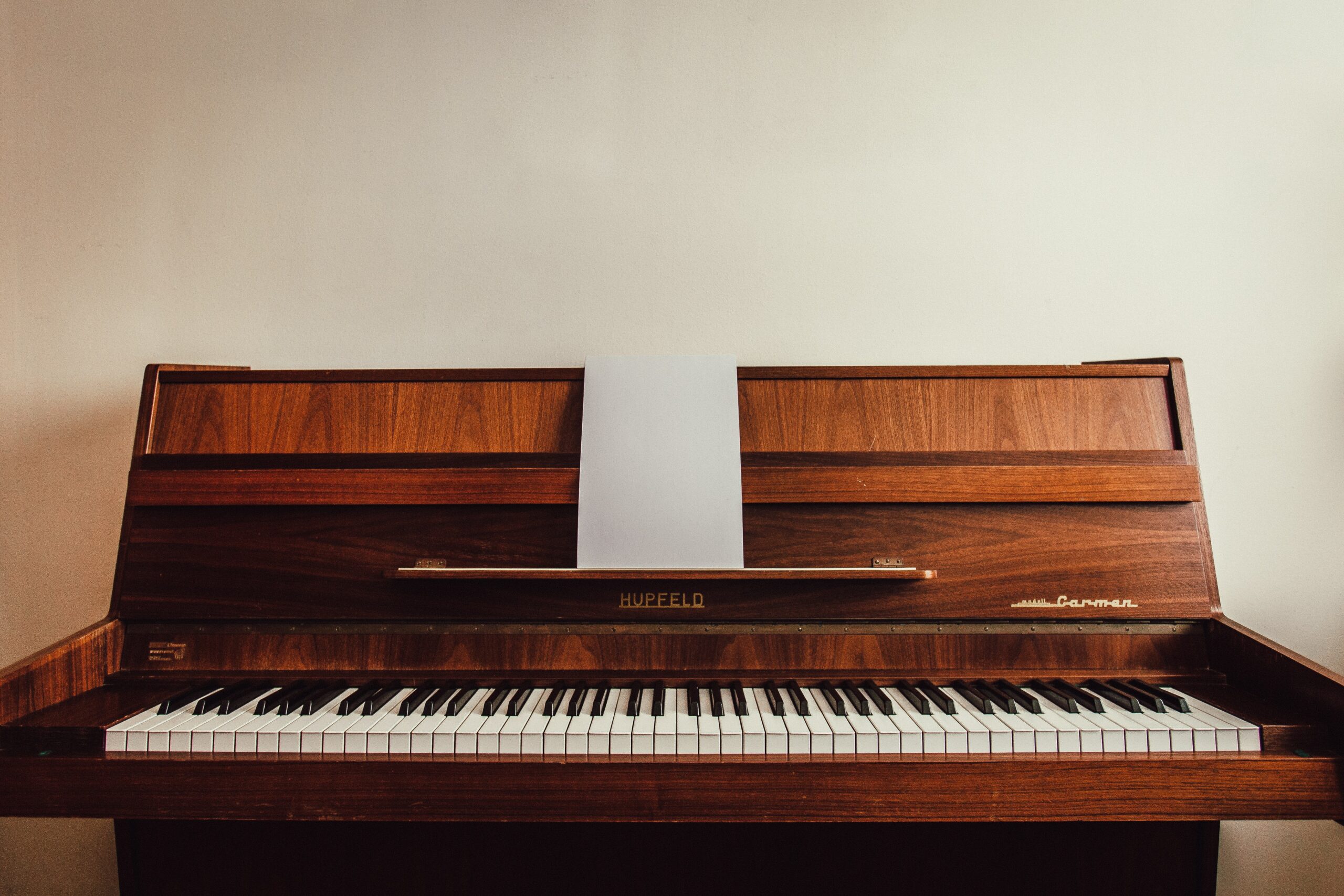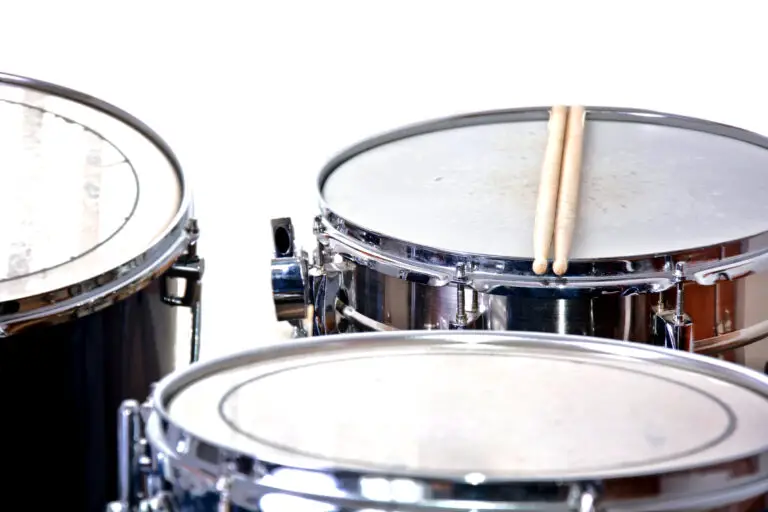Why Does My Piano Sound Tinny?
Ever had a moment with your piano where you’re like, “Why’s it sounding so tinny today?”
It’s a head-scratcher, right? Well, you’re not alone. We’ve all been there, and in this blog post, we’re going to get down to the nitty-gritty of this issue and why it’s worth your attention.
Your piano’s sound isn’t just about personal taste; it’s a big deal.
A primo piano should make your heart sing with its beautiful, full sound. But when it goes all tinny on you, it’s like a party pooper. We’ll chat about why having a top-notch piano is a game-changer.
The most common reasons behind a tinny sound in a piano are from the environment, aging components of the piano, lack of tuning, and poor quality materials.
In this blog post, we’re going to unravel the mystery behind that annoying tinny piano sound. We’ll dive into what might be messing with your musical mojo, from neglect to the environment, and how you can turn things around. Stick with us, and soon you’ll be enjoying your tunes without that pesky tin-can vibe.
Understanding Piano Tones
Let’s get down to the nuts and bolts of how your piano produces sound.
The Anatomy of a Piano
Inside your piano, there’s a whole bunch of stuff working together to make music. We’ll break it down so you can see what’s happening in there.
The Role of Strings and Hammers
Ever wondered how pressing those keys can make your piano go from soft to loud? It’s thanks to the strings and hammers. We’ll explain how they team up to create different sounds.
The Soundboard and Resonance
The soundboard is like the amplifier of your piano. It takes the vibrations from the strings and turns them into the music you hear. We’ll demystify how this piece works and why it’s crucial for your piano’s sound.
Common Causes of Tinny Piano Sounds
Let’s take a closer look at why your beloved piano might be producing that undesirable tinny sound. There are four primary culprits to consider:
1. Lack of Tuning and Maintenance
Think of your piano as a finely tuned instrument, which it is, quite literally.
Over time, the strings in your piano can stretch or contract due to changes in temperature and humidity.
This can throw the tuning out of whack. If you neglect regular tuning and maintenance, it’s like driving a car without changing the oil – it’s bound to start running poorly.
Inconsistent tuning can cause certain notes to sound tinny and out of harmony with the rest of the keys.
To prevent this, it’s essential to schedule regular tuning sessions with a professional piano tuner.
They’ll keep your piano’s sound in tip-top shape and extend its lifespan.
2. Aging Components
Just like people, pianos age, and with age comes wear and tear.
Key components like the strings, hammers, and dampers can lose their original vitality over time. When these parts aren’t functioning at their best, your piano’s sound quality can deteriorate, resulting in that tinny tone.
Old, worn-out hammers may strike the strings unevenly, causing inconsistent sound production.
Additionally, the felt dampers can become less effective, causing strings to vibrate excessively and produce an undesirable metallic ring. Replacing or refurbishing these components can restore your piano’s rich, full sound.
3. Poor Quality Materials
Not all pianos are created equal. If your piano was constructed with subpar materials or craftsmanship, it may be predisposed to a tinny sound.
Low-quality strings, hammers, and soundboards can all contribute to this problem. Inexpensive materials might not resonate or transmit sound as effectively as their high-quality counterparts.
If your piano simply has poor quality materials, you might need to consider investing in a higher-quality instrument overall.
There are some cases where you can upgrade or replace specific piano parts as well, which I’ll get into later in this article.
4. Environmental Factors
Pianos are sensitive creatures when it comes to their environment. Any minor fluctuations in temperature and humidity can wreak havoc on your piano’s tone in the long run.
Wood, the primary material used in piano construction, is highly responsive to environmental changes. When exposed to extreme humidity, wood can swell and contract, affecting the structural integrity of the piano.
Inconsistent temperature and humidity levels can cause the soundboard to warp or crack, resulting in unwanted tonal changes, including a tinny sound.
To mitigate this, maintain a stable environment for your piano, ideally with a humidity control system in place.
This simple step can prevent environmental factors from sabotaging your piano’s tone.
How to Fix a Tinny-Sounding Piano

So, you’ve identified that your piano is sounding tinny, but fear not – there are steps you can take to address this issue and bring back the beautiful, harmonious tones you desire.
Here’s a guide on how to fix a tinny-sounding piano:
Schedule Professional Tuning and Maintenance
First and foremost, if your piano hasn’t been tuned regularly, it’s time to call in a professional piano tuner.
Tuning helps ensure that all the strings are at the correct tension, allowing your piano to produce a well-balanced sound.
Regular maintenance by a skilled technician can also identify and address any underlying issues, such as worn-out parts or structural problems.
Consider Component Replacement or Refurbishment
If your piano is aging and you suspect that its components are contributing to the tinny sound, it might be worthwhile to consider component replacement or refurbishment.
This can involve replacing worn hammers, restringing the piano, or refurbishing the dampers.
Such repairs and upgrades can significantly improve the quality of sound your piano produces.
Evaluate Environmental Conditions
Take a close look at the environment in which your piano is placed. Fluctuations in temperature and humidity can wreak havoc on your instrument’s sound.
To maintain stable conditions, consider using a piano-specific humidity control system or placing a hygrometer in the room to monitor humidity levels.
Keep the piano away from drafts and direct sunlight, as these can also affect its tone.
Soundproofing Solutions
Sometimes, external factors like room acoustics can contribute to a tinny piano sound.
Consider using sound-absorbing materials or acoustic panels in the room to improve the overall sound quality.
Experiment with positioning your piano to find the optimal spot for sound projection and resonance.
Explore Voicing Techniques
Voicing is the process of adjusting the hammers inside the piano to achieve the desired tone. A skilled piano technician can voice your piano to produce a warmer, richer sound.
This process involves reshaping the hammers and adjusting their hardness to achieve the desired tonal characteristics.
Upgrade to a Higher-Quality Piano
In some cases, especially if your current piano is of low quality or in poor condition, it might make sense to consider upgrading to a higher-quality instrument.
A better-quality piano will naturally produce a richer, more resonant sound.
When making this decision, be sure to try out different pianos to find one that matches your preferred tonal characteristics.
Remember that addressing a tinny piano sound may require a combination of these steps, and it’s often best to consult with a professional piano technician to determine the most appropriate course of action for your specific instrument.
With the right care and adjustments, you can restore your piano’s full, vibrant sound and continue to enjoy making beautiful music.
When To Get Professional Help With Your Piano’s Sound
When dealing with a tinny-sounding piano, sometimes it’s best to bring in the experts.
They can provide valuable insights and recommendations to help you get your piano back in top shape.
Consulting a Piano Technician
A qualified piano technician is your go-to resource for diagnosing and addressing issues with your piano’s sound.
These professionals are trained to assess the instrument’s condition, identify problems, and implement the necessary repairs or adjustments.
Whether it’s tuning, voicing, or more extensive repairs, a piano technician has the knowledge and experience to make your piano sound its best.
Getting a Piano Assessment
If you’re unsure about the extent of the issues affecting your piano’s sound, consider getting a comprehensive piano assessment. This involves a thorough examination of your piano by a technician.
They will inspect all components, evaluate the instrument’s overall condition, and provide you with a detailed report of their findings.
This assessment will help you understand the scope of the required repairs or upgrades, allowing you to make informed decisions about how to proceed.
Budgeting for Repairs or Replacements
Once you have a clear understanding of your piano’s condition and the necessary repairs or improvements, it’s time to consider your budget.
Piano repairs can vary widely in cost, depending on the extent of the work required and the quality of the components used.
Discuss the assessment results and recommended actions with your piano technician, and work together to create a budget that aligns with your priorities and financial resources.
Final Thoughts
In the world of music, the piano’s ability to convey profound emotions through its rich, resonant tones is undeniable.
Yet, when a piano starts sounding tinny, it can be disheartening. This article unraveled the causes of this issue, ranging from neglect and aging components to environmental factors.
We also explored practical remedies, including tuning, maintenance, and component upgrades.
Seeking professional evaluation and budgeting for repairs were emphasized as essential steps. In the end, with care and expertise, your piano can once again fill your life with beautiful, harmonious music.








